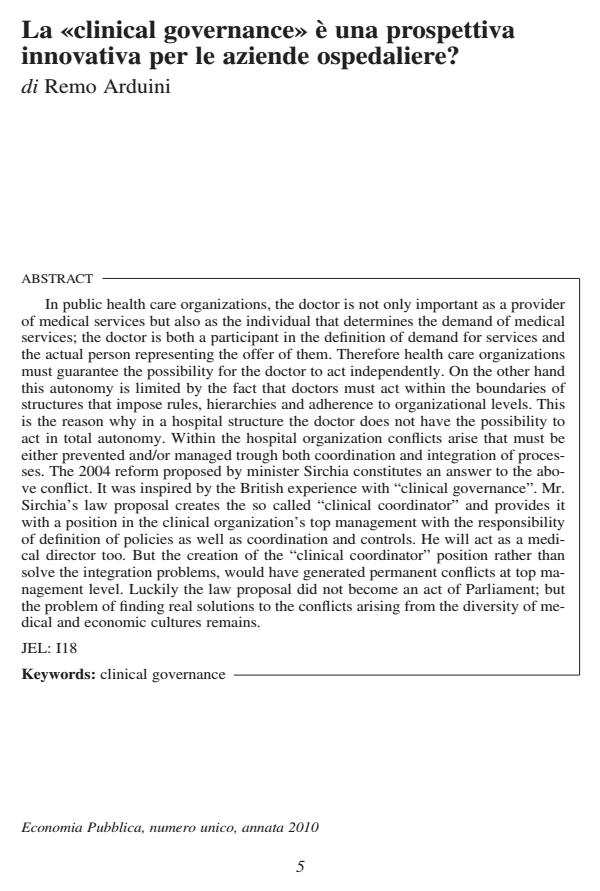La "clinical governance" è una prospettiva innovativa per le aziende ospedaliere?
Titolo Rivista ECONOMIA PUBBLICA
Autori/Curatori Remo Arduini
Anno di pubblicazione 2012 Fascicolo 2010/1-6
Lingua Italiano Numero pagine 30 P. 5-34 Dimensione file 504 KB
DOI 10.3280/EP2010-001001
Il DOI è il codice a barre della proprietà intellettuale: per saperne di più
clicca qui
Qui sotto puoi vedere in anteprima la prima pagina di questo articolo.
Se questo articolo ti interessa, lo puoi acquistare (e scaricare in formato pdf) seguendo le facili indicazioni per acquistare il download credit. Acquista Download Credits per scaricare questo Articolo in formato PDF

FrancoAngeli è membro della Publishers International Linking Association, Inc (PILA)associazione indipendente e non profit per facilitare (attraverso i servizi tecnologici implementati da CrossRef.org) l’accesso degli studiosi ai contenuti digitali nelle pubblicazioni professionali e scientifiche
In public health care organizations, the doctor is not only important as a provider of medical services but also as the individual that determines the demand of medical services; the doctor is both a participant in the definition of demand for services and the actual person representing the offer of them. Therefore health care organizations must guarantee the possibility for the doctor to act independently. On the other hand this autonomy is limited by the fact that doctors must act within the boundaries of structures that impose rules, hierarchies and adherence to organizational levels. This is the reason why in a hospital structure the doctor does not have the possibility to act in total autonomy. Within the hospital organization conflicts arise that must be either prevented and/or managed trough both coordination and integration of processes. The 2004 reform proposed by minister Sirchia constitutes an answer to the above conflict. It was inspired by the British experience with "clinical governance". Mr. Sirchia’s law proposal creates the so called "clinical coordinator" and provides it with a position in the clinical organization’s top management with the responsibility of definition of policies as well as coordination and controls. He will act as a medical director too. But the creation of the "clinical coordinator" position rather than solve the integration problems, would have generated permanent conflicts at top management level. Luckily the law proposal did not become an act of Parliament; but the problem of finding real solutions to the conflicts arising from the diversity of medical and economic cultures remains.
Parole chiave:Clinical governance
Jel codes:I18
Remo Arduini, La "clinical governance" è una prospettiva innovativa per le aziende ospedaliere? in "ECONOMIA PUBBLICA " 1-6/2010, pp 5-34, DOI: 10.3280/EP2010-001001